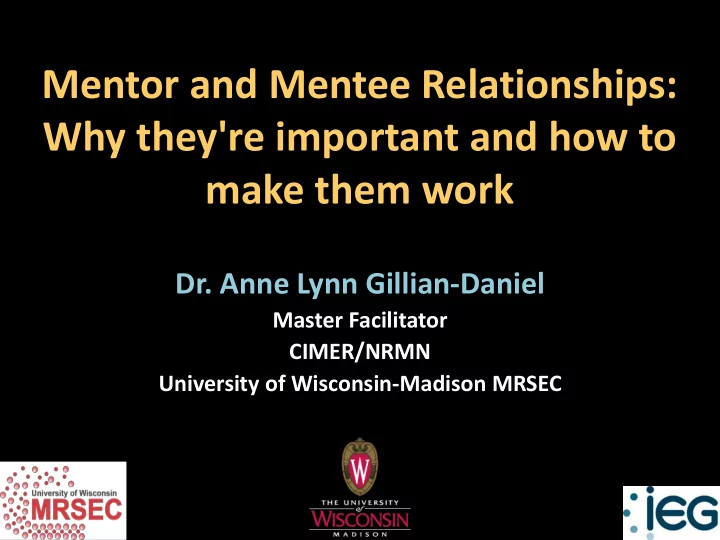

Mentor and Mentee Relationships: Why they're important and how to make them work Dr. Anne Lynn Gillian-Daniel Master Facilitator CIMER/NRMN University of Wisconsin-Madison MRSEC
Visual Explorer Good Morning! Please select an image in response to the question: What does mentoring mean to you?
Session Goals • Reflect on what mentoring means to you • Discuss aligning expectations in mentoring relationships • Practice active listening skills • Consider your mentoring relationships and ways to improve them
Mentoring is: A collaborative learning relationship that proceeds through stages over time and helps mentees acquire the essential competencies needed for success in their chosen career. Uses one’s own experience to guide mentees through an experience that requires personal and intellectual growth and development. Applies to research mentoring, career coaching, peer mentoring, virtual mentoring, and in some cases advising. Pfund et al., 2016: McGee 2016
Mentoring Relationships Take Many Forms • Formal or casual • In-person or at a distance • Directly or indirectly work-related • Vary in length of time and frequency of communication
We are often both Mentors and Mentees Faculty/Staff MENTOR Graduate MENTOR/ Student MENTEE MENTEE Undergraduate
Research Says Mentoring Matters Strong mentorship has been linked to: • Enhanced science identity, sense of belonging, and self- efficacy (Palepu et al , 1998; Garman et al , 2001; Paglis et al , 2006; Lopatto, 2007; Bland et al , 2009; Feldman et al , 2010; Cho et al , 2011; Chemers et al , 2011; Thiry and Laursen, 2011) • Persistence (Gloria et al , 2001; Solorzano, 1993; McGee and Keller, 2007; Sambunjak et al , 2010; Williams et al , 2015; Bordes-Edgar et al , 2011; Campbell and Campbell, 1997) • Research productivity (Steiner and Lanphear, 2002, 2007; Wingard et al , 2004) • Higher career satisfaction (Schapira et al , 1992; Beech et al , 2013) • Enhanced recruitment of URMs (Hathaway et al , 2002; Nagda et al , 1998)
Mentor Training Curriculum Key elements of mentor training: • Process-based using case studies and group problem solving • Aimed at awareness-raising and reflection • Provides a confidential and brave forum to share the collective experience of mentors across a range of experiences • Distribute and adapt resources to improve mentoring
Mentor Training Competencies: 1. Aligning expectations 2. Maintaining effective communication 3. Promoting professional development 4. Addressing equity and inclusion 5. Assessing understanding 6. Fostering independence 7. Cultivating ethical behavior
Aligning Expectations Problems between mentors and mentees often arise from misunderstandings about expectations and a failure to communicate. Mentor/Mentee compacts or agreements are tools for aligning expectations. Mentees can ask for these agreements.
Aligning Expectations Mentors/mentees can both: 1. Establish mutually beneficial expectations for the mentoring relationship – what are our goals? 2. Clearly communicate expectations for the mentoring relationship – who is in charge of connecting? How will we communicate? 3. Align mentee and mentor expectations – how will we know our needs are being met?
How do you know someone is listening to you? • Eye Contact • Focused (no outside distractions) • Leaning in • Nodding • Summarizing • Asking questions
Active Listening Goals • Maintaining eye contact with the speaker - though respect cultural and individual differences • Clearing your mind of other distractions and focusing on what the speaker is saying and how they are saying it • Asking for clarification when you don’t understand • Attending not only to the words, but also to the feelings behind the words
Activity: Active Listening Role Share/Listen (2 mins) Discuss (2 mins) Debrief (3 mins) Speaker Share a current Develop a plan to Listen to feedback challenge resolve the situation from observer, ask questions, provide reflections on experience. Listener Practice active Ask clarifying Listen to feedback listening skills – do not questions and help from observer, ask respond verbally at the speaker develop questions, provide this time a plan reflections on experience. Observer Observe and note Observe and note Report on tone, body language, tone, body observations. Did facial expression, etc. language, facial the listener actually expression, etc. understand the problem the speaker described?
Reflect on a current mentoring relationship • What is the goal of the mentoring relationship? • Do you have aligned expectations? How could you improve them? • How effective is the communication? What would you like to improve?
Academic Staff Mentor Program Mentoring Objectives • Foster a culture of collaborative learning • Create support system for new professionals • Build professional network • Foster self-direction regarding professional development
Thank you! Questions? Contact Information: Anne Lynn Gillian-Daniel agillian@wisc.edu
Recommend
More recommend